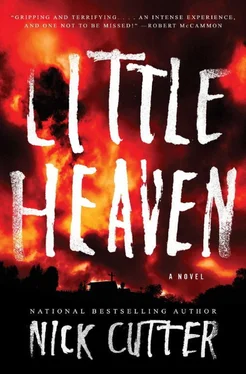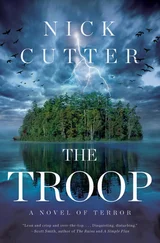After Lennox had put the items into a sack, the man tied him to the lockup cage with Tensor bandages. The knot work was quite good; it took Lennox thirty minutes to twist free, by which point his assailant was gone. The wheelchair was found by the laundry exit.
Report submitted to:Donald Grubman, Chief Executive Officer
_______
Letter postmarked December 15, 1968. Old Ditch, Arizona:
Dear Minerva,
How goes the war, milady? Are you sleeping well?
Hah.
I survived. But I suppose you must know that. You can feel it, as I can feel you. And Micah, too, when the wind blows a certain way. It’s blowing that way now. Cold, yes? Winter, though not anything like the winters of my youth. Winter in Arizona means you might want to stop taking ice in your tea. But it’s the Yuletide season and I suppose I’m maudlin. Or wistful. Such a fine thread between the two. They don’t celebrate Christmas with much gusto in these parts. It’s an old folks’ town and Christmas is for the young, isn’t it? But there are lights, garlands, the odd tree. Another year gone past. Ah, well. God can take all the years I’ve got left. I cannot see much use for them.
I wish to say I’m sorry. I know that will mean nothing to you. I know that it fixes not a goddamn thing. I wish I had that capacity to go back in time, back to when I was a churlish child, a WISEASS, as you Yanks would say, and just… be better. Set myself down a proper path, one that didn’t lead to so much bloodshed and regret. I had people in my life who tried to put me on that good path. Shame I didn’t listen to them nearly enough.
George Orwell wrote that at fifty, everyone has the face they deserve. But some of us get our just deserts earlier than that.
I killed your father. He was a gambler. A common enough vice. Nothing a man ought to be killed over. But I did. I shot him. I could tell you that I did it as a function of my work, that I was no more than an automaton fulfilling its purpose, but every man has his own agency. I didn’t have to kill him. But I had the ability to and he had sinned in a very small way and I felt it fair at the time to take his life for that.
I do not know how my killing your father caused your brother to die. We did not have much time to discuss it, me with your bullet in my leg and you with those children to drive to safety—-which you did, as I was heartened to read about. They all lived. I hope they have grandparents and aunts and uncles to take them in. I hope they forget everything they saw. Children’s minds are supple, isn’t that what the headshrinks say? A child’s mind can be erased and rewritten, fresh. Little Etch A Sketch brains. I hope so.
The fire almost got me. It was a near thing. I dragged myself down to the river. It was running four feet deep. I submersed myself and breathed through a reed—-a REED, my dear, like some cartoon character! Ash fell on the river’s surface; it ran so thick and black that I couldn’t see up, like being sunken in a river of ink. But the fire raged past quite quickly and when it was over I managed to drag myself down to Grinder’s Switch. My knee—-ha! A flesh wound. I’ve had worse. Sometimes I wonder if you shot me in the perfect manner, Minerva my dear. Enough to hurt me and leave me with a constant reminder, but not quite kill me. Were you merciful in the cut? Or was it just luck? I like to think it was the former. If not, don’t wake the dreamer from his dream.
In the commotion, nobody made much note of me. Just another wide-eyed survivor. It was an easy enough matter to steal a car. And later, some medical supplies to patch me up until I could visit Shughrue’s veterinarian friend. I passed out a few times from the pain, but I survived. I don’t know what business I had doing so, but I did.
I think about those days, my darling. What we saw. What we did. What was done to us. I think about evil. Our own and the evil of things ineffably larger than us. Incomprehensible evil, yes? It cannot fit inside my mind. I cannot find the space for it, so it finds its way out in my nightmares. I wake up screaming night after night. But I live alone far from any neighbor, so I doubt I am much bother to anyone. Hah.
We did the right thing, didn’t we? We acted rightly when the chips were down, to use the old cliche’… didn’t we?
I wonder. I suppose all my life I will wonder.
In any event. Now you know for a fact. I EXIST. I am still sucking breath.
So if you are still feeling raw about… all that. Well. You know where to find me.
Yrs, Ebenezer
_______
From “Little Heaven’s Prisoners” (as published in Esquire magazine, January 1970) by Chris Packer:
“He was a devious worm.”
Sister Muriel Hanratty remembers Amos Flesher all too well. His birdlike eyes. His fleshy lower lip. The pale strip of flab that ballooned between his waistband and the bottom of his shirts, which were always a size too small.
His nasty habits.
“He was a fiddler,” she tells me in the atrium of the Wooded Nook Rest Home outside of San Francisco. “Not a violinist,” she clarifies archly. “He touched himself. All the boys did, of course. No stopping that. You could cut their dirty sticks off and they’d still play with them, surely to Christmas. But there’s your garden-variety pawing and then there’s fiddling . It’s a wonder he didn’t whittle the thing away like a bar of soap in the shower, that’s how much he twiddled with it.”
At eighty-seven years old, Sister Muriel isn’t one for niceties. But I have little doubt that she was always a straight shooter. She worked at the San Francisco Catholic Orphanage for fifty years, until its doors shut for good. Budget cuts, Muriel says. A few of the other nuns were moved to Wooded Nook with her, but they have since passed on. She misses them, she says, as well as her time at the orphanage.
But not Amos Flesher. Him she does not miss one bit.
“He poked kids until they bled,” she tells me. “We had a ward full of boys and girls who were soft-headed. Our Children of God. The purest, most open smiles. We put Amos in charge of them during naptime. Amos was old enough; he ought to sing for his supper, we figured. Well, he stuck those poor kids. With a darning needle or a big pin. Most of them were restrained; it’s terrible, but it was for their own good. I started to see blood on their jammies. Their bums, their thighs. First I thought it was bedbugs. But it went on a while. I never caught him doing it. Amos was a sly boy. I don’t know that I’d call him smart— cunning is the word I’d use. Why would he want to hurt those poor children?” She shook her head. “When I heard about what happened out in the woods, I thought: Amos Flesher went and got himself a whole camp full of soft-brains so he could stick them all with pins. He was bloody-minded, Amos Flesher was. Bloody as anyone I’ve known.”
Bloody-minded. It would seem so. In the three years that have passed since the Little Heaven fire (it is properly known as the Black Lands fire, but hardly anyone refers to it by that name), precious little is known about the circumstances preceding it. No adult from Little Heaven lived to tell the tale, including Amos Flesher himself; the children who survived can recall very little of their experience. By the time I was able to arrange interviews with some of them—navigating a web of protective caretakers and foster parents and aunts and uncles—their stories held little in common. It would seem that their minds have embarked on a purposeful act of erasure. They can remember almost nothing, which is likely for the best.
About all that links their stories is a thread of stark, almost unimaginable terror. They talk about seeing their parents covered in blood—flashbulb memories, these searing mental images—though they can no longer recall how that happened. They’ve surrendered the connective tissue between these vivid recollections, the necessary bridgework. One girl talked about “a dark place where a dead baby wouldn’t stop crying.” Noises in the woods. A ghostly giant with the black eyes of a doll. The stuff of childhood nightmares, all of it. The kids’ minds and memories seem to be playing tricks on them, putting the faces of imaginary boogeymen on horrors too real to cope with—the evil of men. The evil of their own mothers and fathers, just maybe.
Читать дальше












